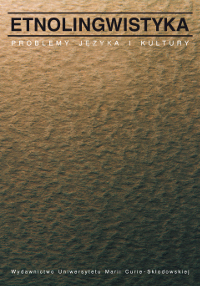Tożsamość nosiciela stereotypów etnicznych
THE IDENTITY OF A CARRIER OF ETHNIC STEREOTYPES
Author(s): Krystyna PisarkowaSubject(s): Anthropology, Language and Literature Studies, Applied Linguistics
Published by: Wydawnictwo Naukowe Uniwersytetu Marii Curie-Sklodowskiej
Keywords: multiculturalism; the concept of a nation; national stereotype; ethnic stereotype; Polish culture; Jewish culture; Celan; Chopin; Rubinstein; Reich-Ranicki; fatherland
Summary/Abstract: A national stereotype, contrary to the stereotype of a foreigner, is positive, while a spreading multilingual and multicultural nature of contemporary societies modifies the conception of a nation, its progress or regress, the interference of the state and the nation’s very essence in the linguistic sense. The multilingualism of the carriers of ethnic stereotypes requires knowledge of several cultures; e.g. in Poland these would be Polish and Jewish cultures. Por Polish Jews, the Polish language was the language of school, profession and a fascinating culture. Rubinstein, for example, claims in his autobiography that he loves Poland, that lessons of Polish were his joy, that he has a positive stereotype of a Polish man and woman, of the Tatras and Tatra-dwellers, but also that he had a close contact with Jewish culture. Celan, in turn, the most distinguished contemporary poet of the German language, is a typical representative of someone functioning in a borderland area, an expert on and translator of Romanian, German, Hebrew, Russian, English and French texts. Reich-Ranicki identifies himself with German culture, although as a Jew he experienced persecution, a ban on higher education, deportation and a stay in ghetto. AU he had was the German language and the knowledge of German culture: it is this culture that he considers his own. However, he also understands and loves Chopin as a „musical poet”, representing Poland, its great: lyricism, Romantic and later poetry. After the war, he assumes another name (a Slavic one) and answering Grass’s question concerning his identity, he answers: „A half-Pole, half-German and fully a Jew. The homeland he misses is found in art. He is distinguished from others by the loneliness he draws from literature, which allows one to take a metalinguistic stance on the reality reflected in one of the natural languages in which one operates.
Journal: Etnolingwistyka. Problemy Języka I Kultury
- Issue Year: 14/2002
- Issue No: 14
- Page Range: 27-45
- Page Count: 19
- Language: Polish

